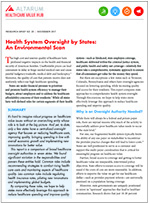Improving Value
Oversight Entities
All states regulate some parts of their healthcare systems, but most lack a comprehensive, inter-agency, multi-payer plan to address this enormous segment of their economy and top concern of residents and employers. For myriad reasons, including market consolidation, profit motive and lack of transparency, healthcare markets left-to-themselves may not deliver the right care, in the right place at the right price. Additionally, our fragmented system limits the ability of any one payer to incentivize the widespread delivery changes needed to reduce costs. As a result, states are well-positioned to work across all healthcare markets and payer types to serve as a collector of evidence, convener and supporter the multi-payer coordination that is critical for meaningful progress on healthcare value.
State oversight entities can take a variety of forms, but key duties include a focus on reducing healthcare costs, improving quality, bringing spending in line with overall economic growth and implementing new innovations for better value.
The Hub's 2017 environmental scan of seven state oversight entities revealed striking variation in the responsibilities and powers these entities hold. Since that brief was published, Delaware has added this capability:
Case StudyThe Delaware Health Care Commission was created as a policy-setting body in 1990. In recent years, the state has enacted a suite of complementary measures that include setting measurement targets, clear definitions of spending categories and a regulatory framework designed to achieve greater value-based care, more lower-cost preventive care, and a primary care focus in healthcare transformation.1 In 2018 Delaware became the first state to both set a healthcare spending growth target and a suite of associated quality benchmarks.2 To start, these quality measures include: emergency department use, opioid overdose deaths and risk factors, and a suite of cardiovascular health measures. The state has also increased data collection on primary care spending and established a Primary Care Collaborative. Finally, the Delaware Health Care Commission will start reporting on health status — adjusted total healthcare costs by line of business (commercial, Medicaid, Medi-gap). |
Notes
1. Walker, Kara Odom, "Focusing on State-Level Primary Care Initiatives: From a Small State With a Great Need," The Milbank Quarterly, Vol. 97 (December 2019).
2. Walker, Kara Odom, "Can A Small State Improve Both Health Care Costs and Health Outcomes? Lessons From Delaware," Health Affairs Blog (June 6, 2019).







